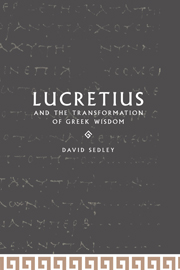Book contents
- Frontmatter
- Contents
- Preface
- Introduction
- Chapter 1 The Empedoclean opening
- Chapter 2 Two languages, two worlds
- Chapter 3 Lucretius the fundamentalist
- Chapter 4 Epicurus, On nature
- Chapter 5 Lucretius' plan and its execution
- Chapter 6 The imprint of Theophrastus
- Chapter 7 The transformation of book I
- Epilogue
- Bibliography
- Index locorum
- General index
- Index of modern scholars
Chapter 7 - The transformation of book I
Published online by Cambridge University Press: 22 September 2009
- Frontmatter
- Contents
- Preface
- Introduction
- Chapter 1 The Empedoclean opening
- Chapter 2 Two languages, two worlds
- Chapter 3 Lucretius the fundamentalist
- Chapter 4 Epicurus, On nature
- Chapter 5 Lucretius' plan and its execution
- Chapter 6 The imprint of Theophrastus
- Chapter 7 The transformation of book I
- Epilogue
- Bibliography
- Index locorum
- General index
- Index of modern scholars
Summary
THE CONTENTS
I argued in Chapter 5 that Lucretius, for reasons perhaps connected with the enormous size of his Greek source text, initially drew large quantities of material from it en bloc, following its order of exposition fairly mechanically. In a second phase, he set about reorganising it into the carefully structured six-book poem that we know. But he did not live to complete the task. By the time of his death he had got as far as reversing books III and IV into their present numbered order; and he had, as far as I can tell, fully reworked the contents of books I–III. However, he had plans for the reorganisation of books IV–VI which can be recovered from his proems, but which he did not live to put into effect. In their present state, books IV–VI to a large extent simply reproduce the sequence of the corresponding books of On nature. It is likely that the same was true of the opening books in the first phase of composition.
In this chapter I want to give an idea of what the completed reorganisation of his material in books I–III may have involved. But I shall select for the purpose the contents of book I only. Even here I shall largely pass over the proem, which I have dealt with separately in Chapter 1.
- Type
- Chapter
- Information
- Lucretius and the Transformation of Greek Wisdom , pp. 186 - 202Publisher: Cambridge University PressPrint publication year: 1998



